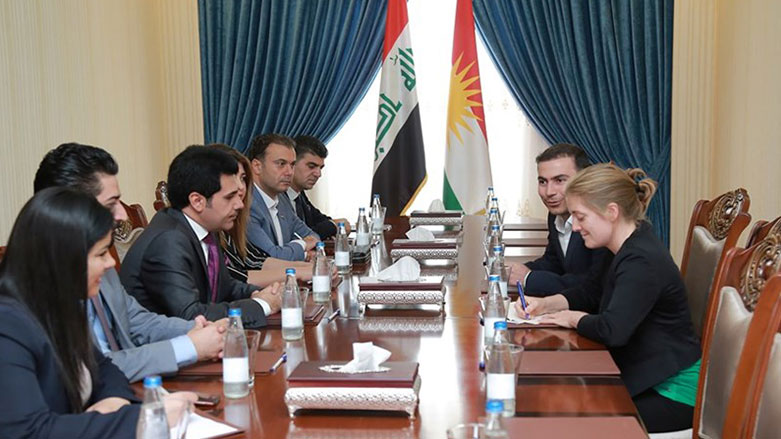Parliament delivers concerns to Germany over Merkel’s Kurdistan independence comment

ERBIL (Kurdistan 24) – The Kurdistan Parliament on Wednesday delivered a letter to the German Consulate outlining concerns regarding recent comments made by Chancellor Angela Merkel against the creation of an independent Kurdistan in the Middle East.
The Foreign Relation’s parliamentary committee of the autonomous Kurdistan Region, headed by Rebwar Babkaye, on Wednesday met with the deputy Consul-General of Germany in Erbil for Political, Economic, and Humanitarian Affairs, Barbara Schumacher, according to the press office of the Kurdistan Parliament.
The meeting with Schumacher was held in lieu of German Consul-General Barbara Wolf as she was on a trip to Germany.
The committee praised Germany’s to the Kurdistan Region over the past few years in the fight against the Islamic State and highlighted bilateral relations between Erbil and Berlin, Babkaye told Kurdistan 24 on Thursday.
Lawmakers during the session, however, also shared the concerns of the people of the Kurdistan Region on recent comments by Merkel against Kurdish statehood and handed over an English-written letter to Schumacher to deliver to Merkel, signed by 32 lawmakers from different factions.

Earlier in June, during a visit to a local school in the Lower Saxony's town of Goslar, Merkel met with a group of students where she stated that she opposes the creation of an independent Kurdish state, and supports the “territorial integrity of Iraq,” claiming it contributes to the stability of the Middle East.
“I do not think a Kurdish state would serve peace in the region,” Merkel said.
It was the first time the senior German official had publicly expressed her opposition to the establishment of an independent Kurdish state.
Her comments came less than two years after the Kurdistan Region’s referendum on independence from Sep. 25, 2017, which saw 93 percent of the people favoring secession from Iraq.
“Kurds have been striving for independence for more than a century, and self-determination is a legitimate right of all nations around the world,” Babkaye argued.
Days after Merkel’s comments, Mark Hauptmann, a German lawmaker of the Christian Democratic Union (CDU), in a statement criticized Merkel's double standards.
“The Federal Republic of Germany sometimes has double standards when it comes to the right of self-determination for people: in the case of Kosovo, it was advocated, but in the case of Kurds, not. The fact is: Iraq is not a historically mature national state, but an artificial state that exists within the borders that were drawn in the colonial era,” Hauptmann said.
“If you actively support the self-defense of a region on one hand, you cannot ignore or restrict their demands for self-determination. The wish of the Kurdish people is not to just defend their territory, but to also manage it independently. This is logical considering the political situation in the region. A Kurdish state and its government could be an anchor for stability in the crisis-ridden region.”


Merkel’s opposition outraged Kurds around the world, who strongly criticized her words on social media networks and expressed their concerns.
Editing by Nadia Riva
(Wladimir van Wilgenburg contributed to this report)
